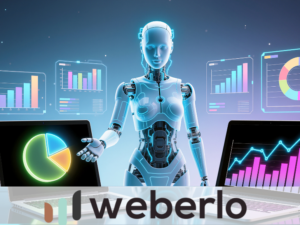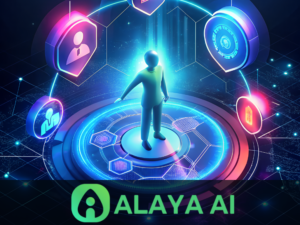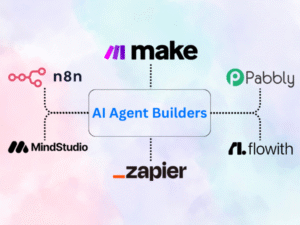Responsible AI can help mitigate issues such as bias, discrimination, and privacy concerns. By ensuring transparency, fairness, and accountability, responsible AI promotes ethical decision-making and reduces the risks of harmful outcomes in sectors like hiring, healthcare, and security.
In this Blog we will read about What Is Something Responsible AI Can Help Mitigate, let’s start you know that Artificial Intelligence (AI) is rapidly evolving and becoming integrated into many aspects of our daily lives from autonomous vehicles to personalized marketing, healthcare diagnostics, and even smart home assistants. While AI promises significant benefits, it also comes with challenges. In this article, we will explore how responsible AI can help mitigate some of these issues and ensure that the development and deployment of AI technologies are ethical, fair, and beneficial for society.
MCQ
What Is Something Responsible AI Can Help Mitigate?
A) AI job creation
B) AI bias and discrimination
C) AI energy consumption
D) AI speed improvement
Answer: B) AI bias and discrimination
Further explain In detail read till last…

What Is Responsible AI?
Responsible AI refers to the development and use of artificial intelligence in a way that is ethical, transparent, accountable, and inclusive. It focuses on ensuring that AI systems are designed to make fair decisions, protect user privacy, and reduce any harms. Essentially, it is about putting safeguards in place to make sure AI works for the betterment of society while addressing potential risks and negative outcomes.
The Role of AI in Society
AI is becoming an integral part of society, transforming industries, improving efficiency, and driving innovation. However, this power also brings risks that need to be carefully managed. Responsible AI is key to ensuring that these technologies are not only useful but also safe and best for all individuals.
Why Is Responsible AI So Important?
Without responsible practices, AI systems can perpetuate biases, invade privacy, and create discriminatory practices. That’s why AI governance, ethics, and regulation are critical to mitigate harm and avoid unintended consequences. Responsible AI ensures that the technology is aligned with societal values and is developed with human welfare in mind.
The Problem of Bias in AI Systems
One of the major concerns with AI is bias. AI systems learn from historical data, and if that data is biased, the AI can perpetuate or even change those biases. This could lead to unfair outcomes, especially in sensitive areas like hiring, criminal justice, and lending.
Understanding Bias in AI
Bias in AI arises when the data fed into the algorithm reflects historical inequities or stereotypes. For example, if an AI system is trained on data from a hiring process that has traditionally favored certain demographic groups, the AI might replicate those biases in its decision-making.
How AI Bias Affects Real-World Decisions
AI bias can lead to discrimination against minorities, women, and other underrepresented groups. This might result in job discrimination, unequal healthcare outcomes, or biased criminal sentencing, among other issues. For instance, an AI system used in hiring might unintentionally favor male candidates over female ones due to biased training data.

Responsible AI’s Role in Mitigating Bias
Responsible AI can help mitigate bias by using diverse and representative data sets, implementing algorithmic transparency, and continuously testing AI systems for fairness. Techniques like algorithmic fairness audits can help ensure that AI systems are not perpetuating harmful biases.
Discrimination and Fairness in AI
Discrimination is another critical issue in AI systems, especially when they are used to make decisions that affect people’s lives, such as loan approvals or criminal sentencing. Fairness in AI involves ensuring that these systems do not discriminate against individuals based on factors like race, gender, or socioeconomic status.
Discrimination Issues in AI Systems
AI systems can inadvertently discriminate against certain groups if they are not properly trained or if they rely on biased data. For example, facial recognition systems have been shown to have higher error rates for people of color and women compared to white men.
Fairness as a Key Principle of Responsible AI
Responsible AI emphasizes fairness in the design and deployment of AI technologies. This involves creating algorithms that treat everyone equally and don’t disadvantage any group based on arbitrary factors. Ensuring fairness might require modifying the data or adjusting how the AI evaluates different outcomes.
Solutions for Reducing Discriminatory Outcomes
To reduce discrimination, developers can implement fairness-aware algorithms, which actively correct for biases in training data. Additionally, creating diverse development teams and conducting fairness audits are important steps in ensuring AI systems are truly impartial.
Accountability and Transparency
Accountability and transparency are vital in responsible AI. Without clear accountability, it’s hard to know who is responsible when AI systems go wrong. And without transparency, it can be difficult to trust how AI makes decisions.
The Lack of Accountability in AI Systems
One major concern is the lack of clear accountability when AI systems cause harm. If an AI system makes a biased hiring decision, for example, it’s important to know who is accountable for that decision—the developer, the company, or the AI itself.
The Need for Transparency in AI Decisions
Transparency in AI means making the decision-making processes of AI systems understandable to humans. This could involve explaining how algorithms arrived at certain conclusions, particularly in critical areas like healthcare and criminal justice.
How Responsible AI Can Ensure Accountability and Transparency
Responsible AI practices can address this by implementing explainability in AI systems and creating clear governance frameworks that hold developers and organizations accountable for the impact of their AI systems. This includes setting up independent audits and using clear metrics to evaluate AI performance.
Job Displacement and Automation
The rise of AI and automation has raised concerns about job displacement. As AI systems become more capable, there is a fear that many workers will be replaced by machines. However, responsible AI can help mitigate this challenge by promoting ethical AI deployment and ensuring that automation leads to job creation rather than destruction.
The Fear of Job Loss Due to AI and Automation
AI-driven automation can replace tasks that are repetitive or dangerous, but it can also eliminate entire job categories, creating economic instability for certain sectors. However, the shift to AI could also lead to the creation of new types of jobs.
How Responsible AI Can Create Opportunities for Workers
Responsible AI can help workers transition to new roles by offering training programs, creating new opportunities in tech, and ensuring that the benefits of automation are shared widely. Moreover, AI can be used to enhance human work rather than replace it.
Ensuring Ethical Deployment of AI in the Workforce
By adopting responsible AI practices, companies can implement strategies that balance automation with workforce development. This might involve upskilling workers, promoting job retraining programs, and encouraging responsible AI policies at the governmental level.
Privacy Concerns with AI
AI’s ability to process massive amounts of data poses significant privacy risks. Personal information, behaviors, and preferences are being tracked and analyzed by AI systems, raising concerns about data misuse and invasion of privacy.
AI’s Impact on Personal Privacy
As AI technologies evolve, they increasingly have access to sensitive personal data. If this data is not handled securely, it could lead to privacy violations. For example, AI systems used in healthcare could expose personal medical records if not properly safeguarded.
Responsible AI’s Approach to Data Privacy
Responsible AI practices prioritize data privacy by ensuring that personal information is anonymized, encrypted, and securely stored. AI developers must adhere to data protection regulations, such as GDPR, to mitigate privacy risks.
How AI Can Balance Innovation and Privacy Protection
AI can innovate without sacrificing privacy by using privacy-preserving technologies like differential privacy or federated learning. These methods allow AI systems to learn from data without accessing personal information directly.
Security Threats and AI Safety
AI presents significant security risks, from cyberattacks to autonomous weapons. Responsible AI ensures that these risks are addressed and that AI systems are safe from misuse.
The Rising Security Concerns with AI
As AI becomes more advanced, the potential for malicious use increases. For instance, AI-powered cyberattacks could exploit vulnerabilities in critical infrastructure, or autonomous weapons could be used in warfare.
Responsible AI in Preventing Cybersecurity Threats
Responsible AI approaches prioritize security by implementing safeguards that prevent AI systems from being hijacked or misused. Ethical frameworks for AI use must address the potential for security threats and put measures in place to prevent harm.
Read About this on Linkedin post- Creative content

How AI Can Contribute to Safer Online Spaces
AI can be used to bolster cybersecurity efforts by detecting anomalies, identifying threats in real time, and providing early warnings for potential attacks. Responsible deployment of AI can help ensure a safer digital environment.
AI in Healthcare: Mitigating Errors
AI has the potential to revolutionize healthcare by assisting with diagnoses, predicting disease outbreaks, and personalizing treatment. However, AI in healthcare must be deployed responsibly to avoid errors that could jeopardize patient safety.
AI’s Potential in Healthcare
AI can help doctors diagnose diseases more accurately, streamline administrative tasks, and even suggest personalized treatment plans based on patient data. In some cases, AI could even predict diseases before symptoms appear.
The Risk of Medical Errors with AI in 2024
However, if AI is not properly trained or tested, it could make critical mistakes in diagnosis or treatment recommendations. This could lead to harm or even death, particularly in high-stakes healthcare environments.
How Responsible AI Can Improve Healthcare Outcomes
Responsible AI can improve healthcare by implementing rigorous testing protocols, ensuring transparency in AI-driven decisions, and working closely with medical professionals to enhance patient care.
Environmental Impact of AI
AI is not only a tool for solving problems, but also a potential contributor to environmental challenges. The energy consumption of AI systems, particularly large machine learning models, can have a significant environmental impact.
AI’s Role in Energy Consumption
Training large-scale AI models requires immense computational power, which consumes a lot of electricity and emits greenhouse gases. This can exacerbate environmental issues, such as climate change.
The Environmental Risks of AI
The environmental risks of AI include not only energy consumption but also the electronic waste produced by AI hardware. Additionally, large data centers supporting AI operations often require cooling, further adding to their environmental footprint.
How Responsible AI Can Promote Sustainability in 2024
Responsible AI practices aim to minimize the environmental impact by optimizing algorithms for energy efficiency, using renewable energy sources for data centers, and creating sustainable hardware.
Conclusion
In conclusion, responsible AI holds the key to mitigating a range of challenges that AI technologies present. From bias and discrimination to privacy and security risks, responsible AI can help create a more equitable, transparent, and secure future. By implementing ethical practices, we can ensure that AI benefits everyone and minimizes harm.
FAQ
Responsible AI seeks to ensure that AI systems are developed and deployed in ways that are ethical, fair, transparent, and aligned with societal values.
AI bias occurs when AI systems are trained on biased data, leading them to replicate and sometimes amplify existing prejudices or stereotypes.
Yes, responsible AI can create new job opportunities, especially in tech-related fields, by automating repetitive tasks while leaving room for human workers in higher-level roles.
AI systems often require large amounts of personal data, which raises concerns about data privacy. Responsible AI emphasizes securing personal data and ensuring it is used ethically.
Responsible AI practices include fairness audits, transparency in decision-making, privacy protection, and ensuring AI is used to enhance human capabilities without causing harm.
I’m a passionate AI enthusiast and the founder of AI UPSURGE. With a deep interest in the latest developments in artificial intelligence, I’m dedicated to making AI accessible and understandable for everyone. Through insightful articles, practical guides, and aims to empower readers to harness the power of AI in their daily lives and professional endeavors. When not writing or exploring the latest AI trends.







